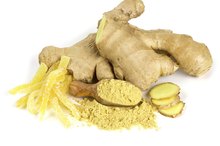Coughing incessantly may cause nausea. Nausea may make you vomit if it becomes severe enough. Certain herbs and medicines can help relieve the nausea symptoms associated with coughing. If your cough is persistent enough, speak to your doctor about the cause of your cough and a possible solution to help your cough go away for good.
Ginger
Ginger can help relieve nausea, according to the American Cancer Society 14. It has long been used to treat stomach upset, loss of appetite and motion sickness. Ginger also helps to relieve the onset of nausea brought on by chemotherapy treatments and may help to reduce vomiting. Sometimes surgery patients and pregnant women use ginger to help reduce symptoms of nausea. Ginger may impact blood clotting; ask your doctor if you can take ginger if you’re on blood thinners or other similar medications. Ginger may cause heartburn, upset stomach, gas and bloating.
- Ginger can help relieve nausea, according to the American Cancer Society 1.
- Ginger also helps to relieve the onset of nausea brought on by chemotherapy treatments and may help to reduce vomiting.
Ipecac
Ginger Ale & Heart Palpitations
Learn More
Ipecac, also known as Ipecacuanha, helps relieve nausea associated with coughing, according to the University of Maryland Medical Center 2. Certain cough syrups contain Ipecac as an ingredient, according to Drugs.com 3. Ipecac may induce vomiting so only use it as instructed by the product label or as directed by your physician. It’s typically used for those who experience a deep, wet cough along with nausea and gagging. Ipecac works especially well in infants with bronchitis, according to the University of Maryland Medical Center 2. When taking Ipecac, you may experience diarrhea, drowsiness and lethargy.
Cloves
Cloves are an aromatic spice typically grown in South America and areas of Asia. Cloves and clove oil may help reduce nausea, ease cold symptoms and allergies as well as improve digestion and fight intestinal parasites, according to the American Cancer Society 14. Clove and clove extracts provide antioxidants which help destroy the free radicals that can damage cells. The active ingredient in cloves is called eugenol. Avoid taking cloves if you are allergic to eugenol. Clove supplements may cause bleeding if you take blood thinners. Pregnant women are advised not to take cloves as the safety of cloves during pregnancy is unknown. Undiluted clove on or near your teeth may cause damage or irritation to your gums and mouth. Undiluted clove can also cause rashes, skin irritation and burns, according to the American Cancer Society 14.
Related Articles
References
- American Cancer Society: Ginger
- University of Maryland Medical Center: Cough
- Drugs.com: Ipecac
- American Cancer Society: Cloves
- Mohan R, Jose S, Mulakkal J, Karpinsky-semper D, Swick AG, Krishnakumar IM. Water-soluble polyphenol-rich clove extract lowers pre- and post-prandial blood glucose levels in healthy and prediabetic volunteers: an open label pilot study. BMC Complement Altern Med. 2019;19(1):99. doi:10.1186/s12906-019-2507-7
- Alqareer A, Alyahya A, Andersson L. The effect of clove and benzocaine versus placebo as topical anesthetics. J Dent. 2006;34(10):747-50. doi:10.1016/j.jdent.2006.01.009
- Krasnova TN, Samokhodskaya LM, Ivanitsky LV, et al. Impact of interleukin-10 and interleukin-28 gene polymorphisms on the development and course of lupus nephritis. Ter Arkh. 2015;87(6):40-44. doi:10.1080/09540105.2017.1320357
- Hu Q, Zhou M, Wei S. Progress on the Antimicrobial Activity Research of Clove Oil and Eugenol in the Food Antisepsis Field. J Food Sci. 2018;83(6):1476-1483. doi:10.1111/1750-3841.14180
- Du WX, Olsen CW, Avena-bustillos RJ, Mchugh TH, Levin CE, Friedman M. Effects of allspice, cinnamon, and clove bud essential oils in edible apple films on physical properties and antimicrobial activities. J Food Sci. 2009;74(7):M372-8. doi:10.1111/j.1750-3841.2009.01282.x
- Nathan M. The Complete German Commission E Monographs: Therapeutic Guide to Herbal Medicines. Annals of Internal Medicine. 1999;130(5):459. doi:10.7326/0003-4819-130-5-199903020-00024.
- Kumar, D., Tanwar, V.K. Utilization of clove powder as phytopreservative for chicken nuggets preparation. Journal of Stored Products and Postharvest Research. 2011. Vol. 2(1): 11-14.
- Thapa D, Losa R, Zweifel B, Wallace RJ. Sensitivity of pathogenic and commensal bacteria from the human colon to essential oils. Microbiology (Reading, Engl). 2012;158(Pt 11):2870-2877. doi:10.1099/mic.0.061127-0
- Brown SA, Biggerstaff J, Savidge GF. Disseminated intravascular coagulation and hepatocellular necrosis due to clove oil. Blood Coagul Fibrinolysis. 1992;3(5):665-8. doi:10.1097/00001721-199210000-00025
- Lane BW, Ellenhorn MJ, Hulbert TV, Mccarron M. Clove oil ingestion in an infant. Hum Exp Toxicol. 1991;10(4):291-4. doi:10.1177/096032719101000410
- U.S. Food and Drug Administration. Family Smoking Prevention and Tobacco Control Act - An Overview.
Writer Bio
Kristin Davis has been writing since 2004, specializing in the health and fitness fields. She has written for online and print publications including Fitness Monthly and Creative Circle. Davis has certification through the International Fitness Professionals Association as a personal trainer.









